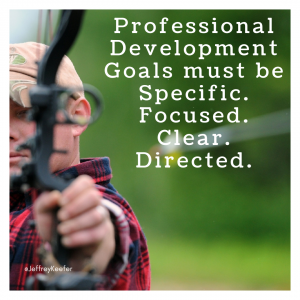Professional Development Goals must be Specific
 This week begins a 5-part series on SMART Goals, those that are Specific, Measurable, Achievable, Relevant, and Time-bound. While basic information abounds on what they are and how they are used, there are fewer resources for how they can be written and applied, specifically in the area of development goals. This application will be the focus of this week’s series.
This week begins a 5-part series on SMART Goals, those that are Specific, Measurable, Achievable, Relevant, and Time-bound. While basic information abounds on what they are and how they are used, there are fewer resources for how they can be written and applied, specifically in the area of development goals. This application will be the focus of this week’s series.
What are Goals?
In a nutshell, goals are objectives we want to achieve. Whether related to some desire for personal growth, increased knowledge or skills, or greater future opportunities, goals are often development oriented. While there are times that they can be related to performance issues, namely goals that are intended to fill some deficit to performing based on some standards or criteria, we will focus more on the former, though the basic approach is the same for both.
Likewise, in this context we are focusing on those goals that are related to organizational or workplace learning in some capacity, and while SMART goals can be done for purely personal reasons, we will limit this exploration to some professional need that is identified.
Goals that are Specific
For goals or objectives to clearly align with whatever short or or long-term intentions we hope to achieve, they nonetheless need to be Specific. This is the S in the SMART acronym, and begins the entire process to narrow the focus.
When goals are Specific, they help us clarify the who, what, where, why, and when that is needed. Lacking specificity will muddy a clear articulation of what will be accomplished or what actions will be taken. Without being Specific, we will be too:
- vague in our desires, making them impossible to accomplish
- unfocused, being unable to take clear action
- too ambiguous, thus lacking a clear path to follow toward achieving desired outcomes
Goals should never be identified unless there is a clear need or want for them. They are frequently made in response to a problem we face, and this relates to a desire to change something in the future that needs an intentional focus. It is this expected future state that helps us identify the specific aspect that will help us to get there. Without a clear plan, we will not only likely fail, we may get distracted in the process and find our lives in tangents.
Professional Development Cases
Let’s consider this in 3 different examples, using a simple case study approach based on a variety of developmental needs I have seen over my years working in educational consulting and talent development.
Thomas is a young highly educated professional who is fond of numbers, math, science, and technology. He works as a research assistant in an R&D (research and development) organization. He has done this role for a couple years, and believes he now wants career advancement and begin to manage staff. He has never done this before, and has a certain fear in determining where to begin with the interpersonal skills he realizes he will need.
Marcy is a middle generic for cialis manager in a large corporation, and she manages a small group of staff in a marketing and public relations division. She loves working directly with print and online materials that her team oversees, though really wants to become a divisional director due to the announced retirement next year of her boss. She wants that job, though is concerned she may not know enough to be able to manage staff remotely in other offices.
Andy is a senior director of call center operations, and he is getting tired of the endless organizational politics he faces. He is increasingly resentful of the extensive amount of hours he is working holding everything together and meeting the team’s increasing quota. He realizes he has work-life balance boundary issues, and believes his family life is beginning to suffer as a result.
Specific Goals for Specific People
All three of these individuals have different needs, contexts, and experiences, so it comes as little surprise that they need individual approaches to getting really specific in their goal statements.
Thomas knows he needs to bolster his interpersonal skills, not because he is afraid of people or is antisocial, but rather because he is afraid of confrontation and the burdens he believes will come with managing staff. Knowing he wants to manage, and being aware of what fears he has that have gotten in his way, he now needs to be specific about what exactly he needs to develop. This can happen by learning about effective management and envisioning what a good manager is, determining what gaps he perceives between this ideal future state and where he is now, and being specific about what exactly he can do to move himself forward.
Marcy knows how to manage people and knows the operational work her team effectively handles, and in seeking to take her retiring boss’s job, issues of managing remotely have become present to her. How can she spend time with and support her staff, those she does not frequently see, when she has never done that before and has always believed you cannot manage those you cannot see? She knows this can be done as her own boss does this, but she feels stuck in articulating a plan for it and fears she will fall apart during the interview. She commits to doing anything she can to prepare, and realizes she needs to boost both her knowledge and skills for this to be possible.
Andy is a seasoned manager and leader of many teams and moving parts within his structure, and while he has the skills to manage down and sideways, what he does not have is the internal boundary he needs to firmly let go and empower his staff to be fully responsible when he is not available or not supposed to be working. He realizes this is connected with his workaholic tendencies and not due to having direct reports who are not fully capable of doing their jobs. While he is a hard-charging professional, he is starting to feel his energies being strained, stretched in ways that is stifling his own creative urges and desire to see more of his family who are moving at their own pace. Andy realizes his boundary issues are less out of a need to constantly work 80 hour weeks, and more from a habit that has been developed over the years, and is thus increasingly hard to break. He needs to become more specifically focused on his time, and as he did not suddenly get into this situation, he will likely not immediately get out of it without specific steps to help him achieve this goal.
Next Steps: Developing SMART Goals
All 3 individuals have needs and future states they want, though all must get specific about the goals they need to set. More about these steps tomorrow . . .






0 Comments